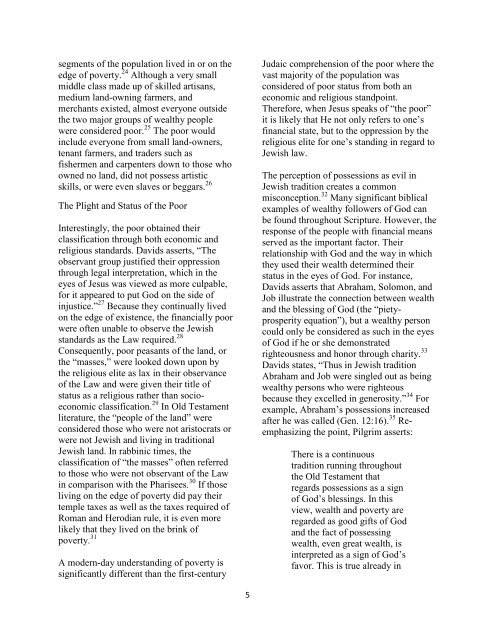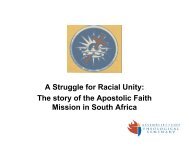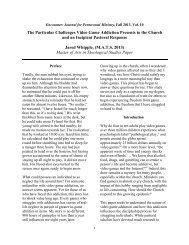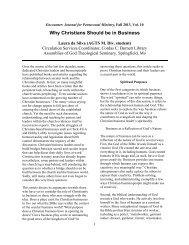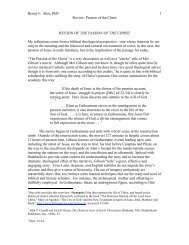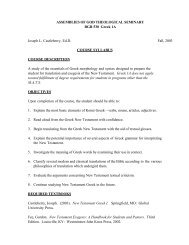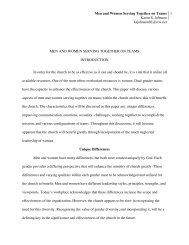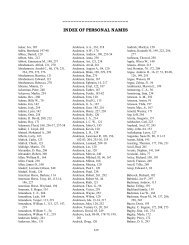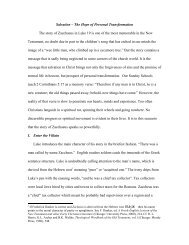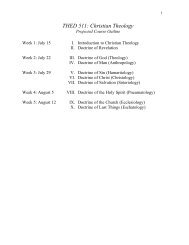Encounter: Journal for Pentecostal Ministry - Assemblies of God ...
Encounter: Journal for Pentecostal Ministry - Assemblies of God ...
Encounter: Journal for Pentecostal Ministry - Assemblies of God ...
Create successful ePaper yourself
Turn your PDF publications into a flip-book with our unique Google optimized e-Paper software.
segments <strong>of</strong> the population lived in or on the<br />
edge <strong>of</strong> poverty. 24 Although a very small<br />
middle class made up <strong>of</strong> skilled artisans,<br />
medium land-owning farmers, and<br />
merchants existed, almost everyone outside<br />
the two major groups <strong>of</strong> wealthy people<br />
were considered poor. 25 The poor would<br />
include everyone from small land-owners,<br />
tenant farmers, and traders such as<br />
fishermen and carpenters down to those who<br />
owned no land, did not possess artistic<br />
skills, or were even slaves or beggars. 26<br />
The Plight and Status <strong>of</strong> the Poor<br />
Interestingly, the poor obtained their<br />
classification through both economic and<br />
religious standards. Davids asserts, “The<br />
observant group justified their oppression<br />
through legal interpretation, which in the<br />
eyes <strong>of</strong> Jesus was viewed as more culpable,<br />
<strong>for</strong> it appeared to put <strong>God</strong> on the side <strong>of</strong><br />
injustice.” 27 Because they continually lived<br />
on the edge <strong>of</strong> existence, the financially poor<br />
were <strong>of</strong>ten unable to observe the Jewish<br />
standards as the Law required. 28<br />
Consequently, poor peasants <strong>of</strong> the land, or<br />
the “masses,” were looked down upon by<br />
the religious elite as lax in their observance<br />
<strong>of</strong> the Law and were given their title <strong>of</strong><br />
status as a religious rather than socioeconomic<br />
classification. 29 In Old Testament<br />
literature, the “people <strong>of</strong> the land” were<br />
considered those who were not aristocrats or<br />
were not Jewish and living in traditional<br />
Jewish land. In rabbinic times, the<br />
classification <strong>of</strong> “the masses” <strong>of</strong>ten referred<br />
to those who were not observant <strong>of</strong> the Law<br />
in comparison with the Pharisees. 30 If those<br />
living on the edge <strong>of</strong> poverty did pay their<br />
temple taxes as well as the taxes required <strong>of</strong><br />
Roman and Herodian rule, it is even more<br />
likely that they lived on the brink <strong>of</strong><br />
poverty. 31<br />
A modern-day understanding <strong>of</strong> poverty is<br />
significantly different than the first-century<br />
5<br />
Judaic comprehension <strong>of</strong> the poor where the<br />
vast majority <strong>of</strong> the population was<br />
considered <strong>of</strong> poor status from both an<br />
economic and religious standpoint.<br />
There<strong>for</strong>e, when Jesus speaks <strong>of</strong> “the poor”<br />
it is likely that He not only refers to one‟s<br />
financial state, but to the oppression by the<br />
religious elite <strong>for</strong> one‟s standing in regard to<br />
Jewish law.<br />
The perception <strong>of</strong> possessions as evil in<br />
Jewish tradition creates a common<br />
misconception. 32 Many significant biblical<br />
examples <strong>of</strong> wealthy followers <strong>of</strong> <strong>God</strong> can<br />
be found throughout Scripture. However, the<br />
response <strong>of</strong> the people with financial means<br />
served as the important factor. Their<br />
relationship with <strong>God</strong> and the way in which<br />
they used their wealth determined their<br />
status in the eyes <strong>of</strong> <strong>God</strong>. For instance,<br />
Davids asserts that Abraham, Solomon, and<br />
Job illustrate the connection between wealth<br />
and the blessing <strong>of</strong> <strong>God</strong> (the “pietyprosperity<br />
equation”), but a wealthy person<br />
could only be considered as such in the eyes<br />
<strong>of</strong> <strong>God</strong> if he or she demonstrated<br />
righteousness and honor through charity. 33<br />
Davids states, “Thus in Jewish tradition<br />
Abraham and Job were singled out as being<br />
wealthy persons who were righteous<br />
because they excelled in generosity.” 34 For<br />
example, Abraham‟s possessions increased<br />
after he was called (Gen. 12:16). 35 Reemphasizing<br />
the point, Pilgrim asserts:<br />
There is a continuous<br />
tradition running throughout<br />
the Old Testament that<br />
regards possessions as a sign<br />
<strong>of</strong> <strong>God</strong>‟s blessings. In this<br />
view, wealth and poverty are<br />
regarded as good gifts <strong>of</strong> <strong>God</strong><br />
and the fact <strong>of</strong> possessing<br />
wealth, even great wealth, is<br />
interpreted as a sign <strong>of</strong> <strong>God</strong>‟s<br />
favor. This is true already in


